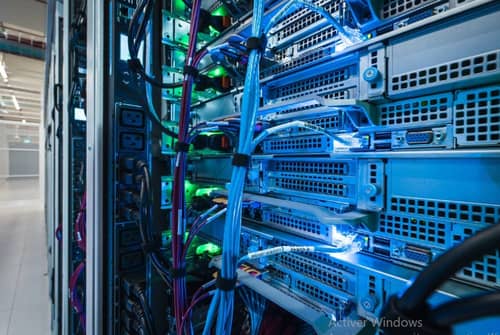 |
| Microsoft uses artificial intelligence to power its data centers |
Microsoft is developing an artificial intelligence system that can analyze data from various sources and generate alerts for data centers and operations teams to prevent or mitigate the impact of security incidents.
A complementary but related system is also being developed to try to detect and predict the impact of data center schemas.
The data centers that power the apps, websites, and services that billions of people use every day can be dangerous places for the people who build and maintain them.
Sometimes employees need to manage electrical devices in the data center while they work. You can be exposed to chemicals such as chlorine, which is used as a disinfectant for the water circulating in the liquid cooling systems of computers and servers.
In June 2015, five people were hospitalized after a chlorine gas leak at the Apple data center in Maiden, North Carolina.
Although data centers are now more secure than ever. But in search of future solutions, some tech giants say they are studying how to use artificial intelligence to avoid security issues.
A Microsoft spokesperson said: "These initiatives are in an early beta phase. They should roll out to our production environment later this year.
Meta also claims to be working on ways for artificial intelligence to predict how its data centers will perform in harsh environmental conditions that could lead to hazardous work environments.
The company says it develops physical models to simulate extreme conditions and runs that data through artificial intelligence models that optimize power consumption, cooling and airflow for its servers.
A Meta spokesperson said: “Our data centers contain critical operational data. Sensors are installed in servers, racks, and data rooms. Each server and network device has a different workload and consumes a different amount of power. It also generates a different amount of heat. And generate different air flows in the data center.
"Our infrastructure team collects all the data from each server and then develops artificial intelligence models that can customize our servers and data center racks and send workloads to those servers to improve performance and efficiency," he added.
Microsoft joins Google and Meta
Organizations have incentives beyond security to ensure that data centers remain in a peak state where downtime is costly and more frequent.
A third of data center owners and operators report having experienced major outages in the past 12 months. One in six said the outage cost them more than $1 million.
Meta operates in more than 20 data centers around the world. Includes new projects totaling $1.6 billion.
Microsoft now operates more than 200 data centers. He said he plans to build 50 to 100 new data centers annually for the foreseeable future.
AI also promises cost savings by creating energy opportunities in data centers, which is another appeal to businesses. Google claimed in 2018 that AI systems developed by its subsidiary DeepMind could save an average of 30% energy compared to the previously recorded power consumption of its data centers.
Microsoft and Meta are now using AI for similar performance improvement purposes. In late 2021, Microsoft introduced a way to measure and mitigate unusual power and water consumption events in data centers. It does this using telemetry data from electrical and mechanical devices.
The company also uses AI-based methods to identify and solve data center power supply issues. You can also use it to optimize server placement to reduce wastage of power, network, and cooling capacity.
Reducing the environmental footprint is an added advantage of energy-regulating AI systems. Data centers consumed about 1% of global electricity demand and contributed to 0.3% of total carbon dioxide emissions in 2020.
Microsoft previously stated that it plans to run all of its data centers using renewable energy by 2025. Meta claimed to have achieved this milestone in 2020.
